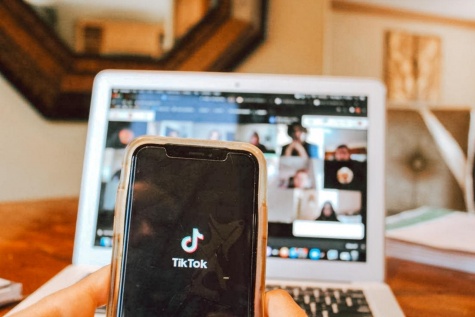
By Kate Hedger | Student Life Editor
September 20, 2020
Most teenagers’ morning routines go a little something like this: wake up, go on TikTok. Brush teeth, go on TikTok. Eat breakfast, go on TikTok. Get distracted on TikTok and realize class started 5 minutes ago. Log on to class, turn off camera, go on TikTok.
For many, TikTok consumes all the empty parts of their day. But is this app really the best way for people to spend their time? My answer is a firm no, and here is why.
TikTok may have some fun craft ideas and cute videos of puppies, but if you really break it down, TikTok is a toxic place for teenagers to spend their time. If we really want to get down to what makes TikTok a negative space, let’s start from the beginning.
I, like many others, downloaded TikTok as a joke in early 2019 after it had rebranded from the popular app, Musically. Thousands downloaded TikTok to see what it was all about, and when the summer of 2019 hit, they stopped treating TikTok as a joke and actually started putting effort into making entertaining videos. Many people view that summer as the “golden age” of TikTok. It was a fresh new app where anyone had the chance to get famous. It was a platform for Generation Z to post lighthearted and creative content. There was no need to look your best like Instagram, or to prove to the world that you had the best day ever like Snapchat. There were hilarious trends, musical puns, and fun summer activity ideas.
As September of 2019 came around, the “golden age” came to an end. At this point, we entered the TikTok full of body shaming and hypersexualized dances we know today. This shift in the app can be accredited to one thing: the rise of TikTok celebrities. As fall of 2019 arrived, so did the rise of people like Charlie D’Amileo and Addison Rae. These two normal teenagers got catapulted into some of the most famous celebrities among Gen. Z for doing simple, short dances. That’s it. No crazy talent, nothing super special, just dancing. And though these stars quickly became famous, they also quickly got hated on.
Once people like D’Amileo and Rae started making money off the app, others realized they could too. This led to TikTok becoming less about lighthearted funny videos and more of a competition. It was a fight for fame and everybody wanted to win. Nowadays, everyone on TikTok has the mentality that tearing others down will somehow bring themselves up. If someone pretty posts something, the comments are all saying they are “fishing” for compliments. If someone who doesn’t have the ideal body type posts something, the comments will call them a whale.
“Every time I go on TikTok I probably see a toxic video every two minutes,” freshman Claire Hedger said. “I always just scroll past them, but they never stop coming up.”
One of the worst parts about TikTok is the sexualization across the app. If you really pay attention to the popular songs, they almost all have a sexual message. There are also dance trends, such as the wildly popular “WAP dance,” which involves twerking on the floor and sexual dance movements to a song about female genitals. As appalling as this sounds, a lot of children and teens participate in inappropriate trends like this in an attempt to get famous.
Another big issue, as mentioned before, is the blatant bullying and body shaming on the app. If women aren’t skinny with a six pack and have perfect proportions, they will almost always receive degrading comments about their weight. ”I feel like I find myself a lot more self conscious and hyper aware of things other people have that I don’t after going on TikTok,” sophomore Sofia Sipelis said. Along with body shaming, I personally have seen TikToks with the message “bring back bullying 2020” in response to a video of someone who has an unusual interest or doesn’t fit a certain beauty standard.
Even though there are some redeeming qualities to TikTok, such as providing entertainment during the pandemic and giving Generation Z something to universally relate to, it causes more harm than good. The toxicity is inescapable, and to anyone who finds they feel worse about themselves after going on the app, I would suggest doing what I did and deleting it. Trust me, it makes your days so much more productive and happy when you don’t have to worry about being consumed by a harfum social media platform.

It’s an unfortunate trend that has been observed in most social media platforms. In my opinion, technology and access are advancing faster than regulation and society can adjust to, complicating the issues you mention. The impact apps like this have on an individual’s psychological development can be absolutely devastating.
This is why every time, I make sure, even if it’s recommended, not to watch tiktoks. It has been like this for long now. People won’t stop. This is just sad and sickening…This is what I need to say.
It’s such a shame what this app has become. I most certainly agree about the sexualised content. It’s disgusting, all of those dances like WAP, I’m just disgusted. The art side of TikTok, however, is not extremely toxic. The Roblox side of it did get sexualised, like this disgusting ‘trend’ that was going around. If you don’t want your child watching inappropriate things, then turn on restricted mode in settings.
this article lays out the basics but i want to go into detail on what videos are shown and what messages the diffrent variety of videos are portraying
Basically every video that exists are filled with toxic comments. Even on Christian topics. Wish people would just give it up.